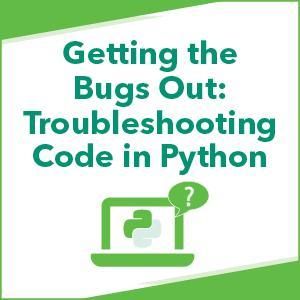Have you ever borrowed code from a Medium blog post or a stack coverflow thread only to find that it doesn't work as advertised? Spent hours trying to figure out an error message? You might agree that debugging can be one of the most frustrating parts of programming. This intermediate-level workshop will introduce techniques for diagnosing errors in Python code and will cover some best practices that can make your code more robust, easier to maintain, and more reproducible.
Attendees will walk through examples of "buggy" Python code, understanding how to interpret errors and identify their causes; learn how to catch and handle errors so as to make code more robust; and explore how sound architecture and good documentation can make code easier to reason about.
It will be helpful to have had prior exposure to Python, such as through the "Introduction to Python" workshop or Python Camp. No installation of Python is needed.
This workshop is part of the Using Programming and Code for Research workshop series for for anyone who wants to get started or learn more about use programming languages like Python, R, or other applications. These tools can help you to collect, manipulate, clean, analyze, and visualize research data or automate many repetitive tasks. If you need personalized assistance with a data analysis, programming, or coding project, consider booking a consultation with one of our librarian-experts.
All sessions are free to GW students, faculty, staff, and alumni.

